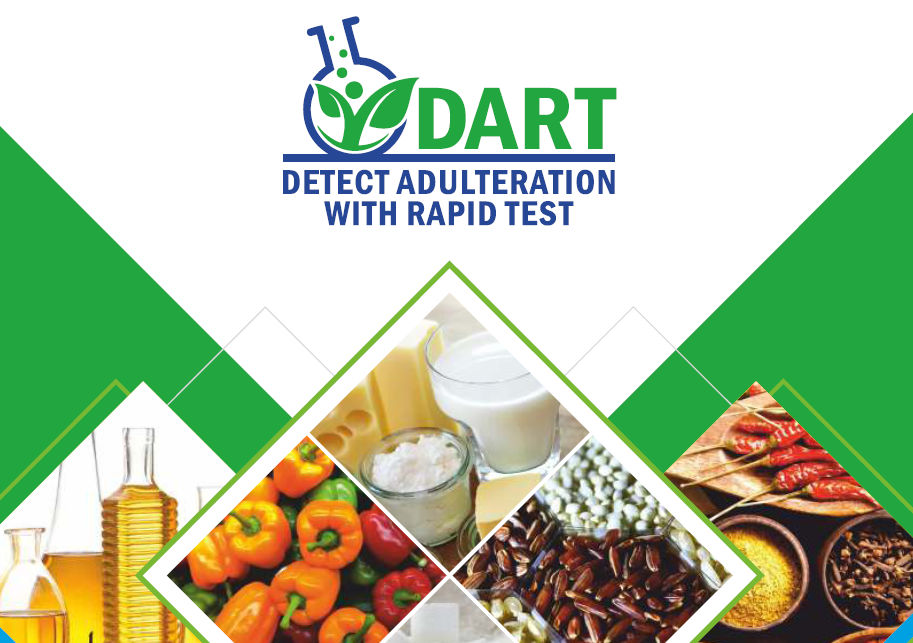Friday, 27 February 2026
FSSAI has recently released DART [Detect Adulteration by Rapid Test] – a book that helps home testing of food products to detect adulteration.
Efficient training of Food handlers and household people is essential with awareness for tracking adulteration and prevention of its harmful effects. FSSAI has recently released DART [Detect Adulteration by Rapid…

Efficient training of Food handlers and household people is essential with awareness for tracking adulteration and prevention of its harmful effects.
FSSAI has recently released DART [Detect Adulteration by Rapid Test] – a book that helps home testing of food products to detect adulteration.
Efficient training of Food handlers and household people is essential with awareness for tracking adulteration and prevention of its harmful effects.
4 Traditional Holi Sweets and Snacks That Could Be Adulterated: Planning to buy your Holi sweets anytime soon. Read this before you visit the next shop.
The common sweets you will find during the festival of Holi are Gujiyas, Malpuas, Thandai, Kheer and Kulfi! Let’s not forget Puran Polis – The sweet, delicious and round format of Happiness, laden with ghee! Nothing can replace these divine items; however, adulteration and contamination with cheaper ingredients and chemicals has found its way into the festive food market.
Paneer, Khoya, Mawa and milk are adulterated with starch to give that thick consistency to the sweets. Puran polis generally have equal parts of whole wheat and refined wheat flour; food businesses use cheap, stale refined wheat flour that can hamper the quality of the sweet.
Paneer, Khoya, Mawa and milk are adulterated with starch to give that thick consistency to the sweets. Puran polis generally have equal parts of whole wheat and refined wheat flour; food businesses use cheap, stale refined wheat flour that can hamper the quality of the sweet.
To check the presence of starch, one can add the questionable raw ingredient in water and few drops of iodine in it. If turned blue, the adulteration is confirmed.
The purchase of Puran Polis or its raw materials should be done from a retailer selling the packed goods with apt labelling and quality checks.
It is also not a surprise to find chemicals, artificial flavours and coloured fake ingredients in place of rich and costly spices, condiments and nuts. Hence, always purchase these ingredients from a certified retailer, or a branded, packaged product.
The latest to join the list of adulteration scams is that in jaggery. Sulphur Dioxide is used in the processing of jaggery – the black syrup is converted into the dark yellow hard mass. The more Sulphur Dioxide used, the brighter the colour. However, Food Safety Regulations does not permit more than 70 ppm of Sulphur Dioxide; in the festive times of Holi, this number increases to as high as 350 ppm – 1,500 ppm. This is detrimental to health of the consumers, which has become an easy means for certain Food Businesses to make quick bucks.
A testing report from NABL Accredited Laboratory seems a better option than simply guessing; however, at such short time, it becomes difficult to get the reports well before time to make amends. Also, there are traces of Metanil Yellow and Sodium Bicarbonate, which can be detected by Hydrochloric acid.
Technology
Ingredion Thailand Achieves 100% Sustainably Sourced Cassava
Feb 27, 2026 | Company News
Deakin University and Bellarine Foods Partner to Develop Sustainable Marine-Derived Proteins
Feb 26, 2026 | Australia
Royal Unveils Refreshed Jute Bag Design for 20lb Authentic Basmati
Feb 25, 2026 | Company News
Food Testing
Australian Medical Bodies Push for Compulsory Health Star Labelling
Feb 24, 2026 | Australia
Tim Hortons Singapore Secures Majlis Ugama Islam Singapura Halal Certification Ahead of Ramadan
Feb 23, 2026 | Company News
More Popular
Fagron Acquires Pharmavit Europe for €68Mn to Expand Nutraceutical Portfolio
Feb 27, 2026 | Company News
Arla Foods Invests EUR 300Mn in New Cheese Dairy in Sweden
Feb 27, 2026 | Company News
Beyond Meat Broadens Portfolio Beyond Protein with Sparkling Plant-Based Drink Line
Feb 27, 2026 | Beverages






